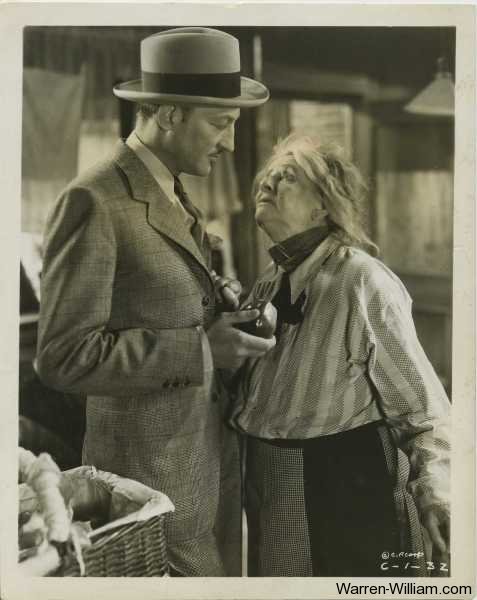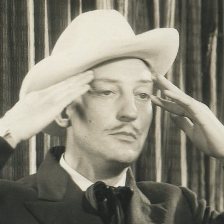I was reading Frederick Lewis Allen’s Since Yesterday: The 1930’s in America when I came across the sentence which inspired this post:
Many men and women in the upper income brackets had never seen a visible sign of this unemployment that they kept reading about until, in the fall of 1930, the International Apple Shippers’ Association, faced with an oversupply of apples, had the bright idea of selling them on credit to unemployed men, at wholesale prices, for resale at 5 cents apiece–and suddenly there were apple-salesmen shivering on every corner (31).
I’ve watched Lady for a Day so many times that I just accepted Apple Annie, never questioning Why Apple Annie. And so that line got me digging.

The source material for Capra’s Lady for a Day, adapted by Robert Risken, was, of course, the short story Madame La Gimp by Damon Runyon, which had originally appeared in the October 1929 issue of Cosmopolitan Magazine. If you noticed the dates don’t jibe that’s for good reason, Runyon’s old lady sold flowers, not apples.
The real-life apple vendor had a short but noteworthy shelf life, numbering by all accounts as high as 6,000 vendors crowding New York City streets in late 1930. But why? Well, there was a reason, the iconic image didn’t just pluck itself from out of the blue. The Pacific Northwest saw an apple surplus that season and armed with a $10,000 fund Joseph Sickler, chairman of the Unemployed Relief Committee of the International Apple Growers Association, set out to start an “an apple selling crusade.”
In “Depression Apples” by James McWilliams, published in the New York Times earlier this year, the author writes that a crate of apples typically costing $2.20 would be wholesaled to the vendors for just $2.00, often on credit as mentioned in the original Allen quote at the top of the page. Vendors passed on the apples for a minimum of a nickel apiece to their customers, some establishing regular clientele, such as Dave the Dude, who’d pay upwards of 50 cents per apple with a wink to charity in those hard times. (The Dude it should be noted placed at least one bill in Annie’s hand, so he was paying his good luck charm well beyond the standard rate.)

A problem arose when the trade caught on so well that the local apple supply dried out and the Association had to import their apples from the Pacific Northwest at an increased cost of $2.50 per crate, all the while refusing to pass along any increase to the vendors. If the economic realities didn’t doom the apple trade the reality of supply and demand, crushed by the influx of sellers which drove that number up to the 6,000 peak, caused prices to depress and make the trade less lucrative for those who’d been fetching higher prices out of the gates.
According to Shields the phenomena was over as early as the Fall of 1931 when the apple seller was replaced by another iconic image, the shoe shiner, who’d only have to lay out for his tools of the trade and not kick back any fees to the apple growers. Another trend to spawn of the apple-seller/shoe-shiner would be the Fuller Brush Salesman, a profession the public would actually see Warren William take-up on screen prior to the release of Lady for a Day as his Chandra tried to go straight in The Mind Reader earlier in 1933.

When Lady for a Day was released in September 1933 the street corner apple vendor was already two years gone as a widespread fad. Riskin, who received an Academy Award nomination for his adaptation, was a native New Yorker who surely had images of Apple Annies fresh in mind when crafting his script. There were obviously individuals still plying the street-side trade, both before and after the craze of 1930-31–Columbia would even bring Schubert Alley’s own version of Apple Annie, a 73-year-old woman, to Lady for a Day’s Radio City Music Hall premier.
One final note of trivia, around the time of Lady for a Day there’d be a comic strip titled Apple Mary which would be published from 1933-39. This would evolve into the more memorable character of Mary Worth.


I had no idea. You always enlighten, Cliff. Also it gets double nerd points for being all about obscure actor love and obscure history nerd-ery. I’m still working on my first Despicable December post. This is inspirational.
Thanks, Jenny! It’s something I never thought about while watching the movie either, but as soon as I read that line I thought, “Ah ha, Apple Annie!”
Looking forward to lots of Warren William on Cinema OCD throughout the month.
Very interesting. I recently attended a community theatre production of “Annie” and had forgotten that one of the ensemble is an apple vendor.
I knew of their existence and disappearance, but didn’t know the reasons why they came about and disappeared. Thanks for the enlightenment.
@mndean For some reason I just never thought about it until I ran into that line in the Allen book. I just imagined that the ‘Apple Annies’ had happened, never realized there had been an actual trigger.
I love Warren William, that wonderful voice & the way he wore a top coat. Geez. Very tall, he was not particularly handsome, he just looked like a man to me. I like Apple Annie May Robson & Ned Sparks, none like that now.
Great post, Cliff –
I love this kind of nuts and bolts history.
I relied heavily on Allen’s “Since Yesterday,” as well as the companion “Only Yesterday,” in writing the Warren William bio. Those two books are invaluable starters for anyone who wants an overview of the 20’s and 30’s.
I still think LFAD is one of Warren’s best performances…
-J
Thanks, John. I was originally going to post this on my more general site, but couldn’t get the image of Warren hawking brushes in The Mind Reader out of my mind and figured it’d be a good close if I used it here instead.
Yes, reading both of those right now in between film books. Going backwards actually, having started with the 30’s. What I love is that it’s more or less period writing and so the stresses are placed on what was seen as important then as opposed to what we take as important now. He seems to have a soft spot for Hoover too, which I find interesting.
Ah, I don’t think I ever disputed Lady as a top performance, I just didn’t rank it high up as a showcase piece for WW newbies.
I alo love the history books by Frederick Lewis Allen. But I am confused because I thought the original Apple Annie was a character from much earlier in the New York of the 1880s.
Thanks for enlightening on the origins of Apple Annies!
When I watched movies/read books about Apple Annies I often wondered
1. Why they sold apples? and 2. Did they make any profit?
I’m a history minor in college and its funny when I take my classes and learn about different events I link them to movies I’ve seen.
This indeed proves you can get a history lesson from a movie – and a classic movie blog 🙂 Thanks!